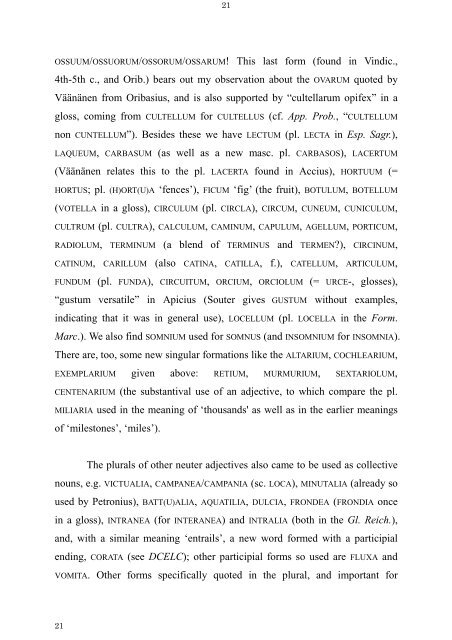The Latin Neuter Plurals in Romance - Page ON
The Latin Neuter Plurals in Romance - Page ON
The Latin Neuter Plurals in Romance - Page ON
Create successful ePaper yourself
Turn your PDF publications into a flip-book with our unique Google optimized e-Paper software.
21<br />
21<br />
OSSUUM/OSSUORUM/OSSORUM/OSSARUM! This last form (found <strong>in</strong> V<strong>in</strong>dic.,<br />
4th-5th c., and Orib.) bears out my observation about the OVARUM quoted by<br />
Väänänen from Oribasius, and is also supported by “cultellarum opifex” <strong>in</strong> a<br />
gloss, com<strong>in</strong>g from CULTELLUM for CULTELLUS (cf. App. Prob., “CULTELLUM<br />
non CUNTELLUM”). Besides these we have LECTUM (pl. LECTA <strong>in</strong> Esp. Sagr.),<br />
LAQUEUM, CARBASUM (as well as a new masc. pl. CARBASOS), LACERTUM<br />
(Väänänen relates this to the pl. LACERTA found <strong>in</strong> Accius), HORTUUM (=<br />
HORTUS; pl. (H)ORT(U)A ‘fences’), FICUM ‘fig’ (the fruit), BOTULUM, BOTELLUM<br />
(VOTELLA <strong>in</strong> a gloss), CIRCULUM (pl. CIRCLA), CIRCUM, CUNEUM, CUNICULUM,<br />
CULTRUM (pl. CULTRA), CALCULUM, CAMINUM, CAPULUM, AGELLUM, PORTICUM,<br />
RADIOLUM, TERMINUM (a blend of TERMINUS and TERMEN?), CIRCINUM,<br />
CATINUM, CARILLUM (also CATINA, CATILLA, f.), CATELLUM, ARTICULUM,<br />
FUNDUM (pl. FUNDA), CIRCUITUM, ORCIUM, ORCIOLUM (= URCE-, glosses),<br />
“gustum versatile” <strong>in</strong> Apicius (Souter gives GUSTUM without examples,<br />
<strong>in</strong>dicat<strong>in</strong>g that it was <strong>in</strong> general use), LOCELLUM (pl. LOCELLA <strong>in</strong> the Form.<br />
Marc.). We also f<strong>in</strong>d SOMNIUM used for SOMNUS (and INSOMNIUM for INSOMNIA).<br />
<strong>The</strong>re are, too, some new s<strong>in</strong>gular formations like the ALTARIUM, COCHLEARIUM,<br />
EXEMPLARIUM given above: RETIUM, MURMURIUM, SEXTARIOLUM,<br />
CENTENARIUM (the substantival use of an adjective, to which compare the pl.<br />
MILIARIA used <strong>in</strong> the mean<strong>in</strong>g of ‘thousands' as well as <strong>in</strong> the earlier mean<strong>in</strong>gs<br />
of ‘milestones’, ‘miles’).<br />
<strong>The</strong> plurals of other neuter adjectives also came to be used as collective<br />
nouns, e.g. VICTUALIA, CAMPANEA/CAMPANIA (sc. LOCA), MINUTALIA (already so<br />
used by Petronius), BATT(U)ALlA, AQUATILIA, DULCIA, FR<strong>ON</strong>DEA (FR<strong>ON</strong>DIA once<br />
<strong>in</strong> a gloss), INTRANEA (for INTERANEA) and INTRALIA (both <strong>in</strong> the Gl. Reich.),<br />
and, with a similar mean<strong>in</strong>g ‘entrails’, a new word formed with a participial<br />
end<strong>in</strong>g, CORATA (see DCELC); other participial forms so used are FLUXA and<br />
VOMITA. Other forms specifically quoted <strong>in</strong> the plural, and important for









